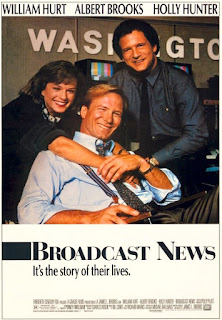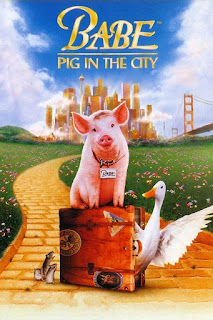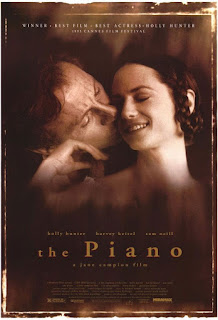December 13th: BROADCAST NEWS (James L. Brooks, 1987)
NOTE: This film will be projected in the high-definition Blu-ray format.
The professional and personal lives of two friends and co-workers in a Washington, D.C. television news bureau are disrupted by the arrival of a charismatic new anchorman.
New Jersey native James L. Brooks was a dropout from NYU, who worked his way up from an usher at CBS to eventually writing for and developing TV shows. His major breakthrough came in 1970 with The Mary Tyler Moore Show, one of the most acclaimed shows in television history. Brooks's other small-screen credits include Taxi, The Simpsons, The Tracey Ullman Show, and Rhoda. He made his debut as a filmmaker with 1983's Terms of Endearment, which earned him Oscar wins for Best Picture, Director, and Adapted Screenplay, as well as acting Oscars for Shirley MacLaine and Jack Nicholson.
For his follow-up, Brooks decided to explore the corrupting influence of corporate control of media, and turned his focus back on television. He first spoke with various journalists at the 1984 Democrat and Republican National Conventions, and realized he could not write a contemporary story with his outdated knowledge from a brief stint in newswriting decades ago, and wound up doing over a year of research interviewing various reporters, producers, and other personnel.
Brooks conceived of a trio of main characters, writing two of them for actors who were in his previous film: Debra Winger and Albert Brooks, the latter a successful writer-director himself (Lost In America, Modern Romance). The third part went to William Hurt (The Big Chill, Body Heat), who had just won an Oscar for his performance in Kiss Of The Spider Woman. When Winger was forced to leave the project due to pregnancy, it took Brooks over a year to find a replacement, just days before shooting was to begin. The role was offered to newcomer Holly Hunter, whose only starring role (Raising Arizona) had not yet been released.
One of the film's key influences was producer Susan Zirinsky, a pioneer of women in TV news, who got her start with CBS at age 20 just before the Watergate scandal broke, and had experience in political and war reporting. Brooks did extensive interviews with her about her work and home life, and much of Hunter's character was based on her, the actress even adopting a similar haircut and clothing style. Zirinsky would wind up serving as an associate producer and technical advisor on set to preserve authenticity. Albert Brooks and Hurt spent time shadowing various reporters and newscasters in preparation.
The film was shot totally on location in Washington, with old existing offices made over as the network newsroom. Behind the camera was veteran cinematographer Michael Ballhaus, known for his work with Martin Scorsese and Rainer Werner Fassbinder. For scenes in the studio control room, over 80 monitors were synced up to play existing footage at various times for background and foreground shots. Jack Nicholson appears in a small role as a national network anchorman.
Brooks did not decide on an ending until the end of production, unsure of what the romantic fate of Hunter's character would be, and alternate endings were shot. Hunter won the award for Best Actress at the Berlin Film Festival and from the Los Angeles and New York film critics, the latter also awarding Broadcast News Best Film, Director, and Screenplay. It received 7 Oscar nominations, including nods for all three of the main actors.
Running time is 2 hrs, 10 min.
The professional and personal lives of two friends and co-workers in a Washington, D.C. television news bureau are disrupted by the arrival of a charismatic new anchorman.
New Jersey native James L. Brooks was a dropout from NYU, who worked his way up from an usher at CBS to eventually writing for and developing TV shows. His major breakthrough came in 1970 with The Mary Tyler Moore Show, one of the most acclaimed shows in television history. Brooks's other small-screen credits include Taxi, The Simpsons, The Tracey Ullman Show, and Rhoda. He made his debut as a filmmaker with 1983's Terms of Endearment, which earned him Oscar wins for Best Picture, Director, and Adapted Screenplay, as well as acting Oscars for Shirley MacLaine and Jack Nicholson.
For his follow-up, Brooks decided to explore the corrupting influence of corporate control of media, and turned his focus back on television. He first spoke with various journalists at the 1984 Democrat and Republican National Conventions, and realized he could not write a contemporary story with his outdated knowledge from a brief stint in newswriting decades ago, and wound up doing over a year of research interviewing various reporters, producers, and other personnel.
Brooks conceived of a trio of main characters, writing two of them for actors who were in his previous film: Debra Winger and Albert Brooks, the latter a successful writer-director himself (Lost In America, Modern Romance). The third part went to William Hurt (The Big Chill, Body Heat), who had just won an Oscar for his performance in Kiss Of The Spider Woman. When Winger was forced to leave the project due to pregnancy, it took Brooks over a year to find a replacement, just days before shooting was to begin. The role was offered to newcomer Holly Hunter, whose only starring role (Raising Arizona) had not yet been released.
One of the film's key influences was producer Susan Zirinsky, a pioneer of women in TV news, who got her start with CBS at age 20 just before the Watergate scandal broke, and had experience in political and war reporting. Brooks did extensive interviews with her about her work and home life, and much of Hunter's character was based on her, the actress even adopting a similar haircut and clothing style. Zirinsky would wind up serving as an associate producer and technical advisor on set to preserve authenticity. Albert Brooks and Hurt spent time shadowing various reporters and newscasters in preparation.
The film was shot totally on location in Washington, with old existing offices made over as the network newsroom. Behind the camera was veteran cinematographer Michael Ballhaus, known for his work with Martin Scorsese and Rainer Werner Fassbinder. For scenes in the studio control room, over 80 monitors were synced up to play existing footage at various times for background and foreground shots. Jack Nicholson appears in a small role as a national network anchorman.
Brooks did not decide on an ending until the end of production, unsure of what the romantic fate of Hunter's character would be, and alternate endings were shot. Hunter won the award for Best Actress at the Berlin Film Festival and from the Los Angeles and New York film critics, the latter also awarding Broadcast News Best Film, Director, and Screenplay. It received 7 Oscar nominations, including nods for all three of the main actors.
Running time is 2 hrs, 10 min.










Comments
Post a Comment